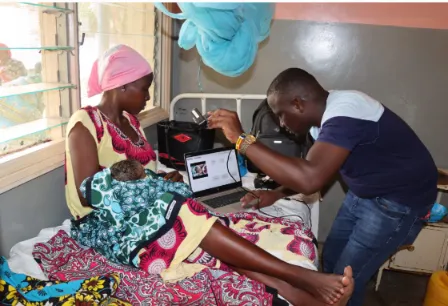The Kenyan government with aid from international donors has been widely pushing for Universal Health Coverage in the Country. That sounds like a good thing, right? Wrong.
The process for accessing the universal healthcare coverage requires biometric registration including fingerprinting and facial recognition. The government did not help in fully disclosing how this data is used in providing healthcare, and it leaves a lot to the imagination of what else all this data will be used for.
However, the most intriguing case has been the recent biometric-based vaccine trial that has been taking place in Kinango Sub-County Hospital in Kwale, Kenya. This hospital is in one of the remote villages in Kenya, and almost all the residents have not had much education. A good majority of these residents do not clearly understand the impact of such a study, and their informed consent should have been obtained through a thorough explanation of this research.
This study that started in September last year has enrolled 1000 newborn babies and their caregivers. It involves a new technology that uses a biometrics vaccination tracking program, fingerprinting of the newborns and recording the voice of caregivers for voice recognition. The group conducting the trial claims that it will allegedly delete all the data after the trial is completed, yet they are planning on rolling out this program throughout Kenya by the end of this year. The study claims that this will help track babies’ identities to their caregivers and manage vaccination implementation for newborns in their first 24 months of life.
The study is being Kenya Medical Research Institute (KEMRI) was working with other partners such as NEC Corporation (the biometric authentication company) and Nagasaki University. NEC Corporation had recently partnered with Microsoft to ‘support digital transformation initiatives’ globally. In November 2022, former Microsoft Co-founder Bill Gates had visited KEMRI, since this institution was one of the recipients of funding from The Gates Foundation for decades.
Some of the projects currently underway at KEMRI were on Maternal and Child Health including the Child Health and Mortality Prevention Surveillance (CHAMPS) among other research initiatives. Notably, in 2022 the Bill & Melinda Gates Foundation invested $200 million for digital public infrastructure that includes digital ID and public registry databases. This funding was to ‘support the achievement’ of UN’s Sustainable Development Goals especially the SDG 16.9 that targets a universal legal identity by 2030, including birth registration. The Gates Foundation supports various programs related to digital ID, including the open-source digital identity platform Modular Open Source Identity Platform (MOSIP). That is why this biometric-based vaccine study has been so controversial. Is it geared towards mass-surveillance or helping Africans?
During COVID-19, Ella Jakubowska a policy and campaigns adviser at European Digital Rights (an advocacy group based in Brussels) cautioned on the dangers of rolling out biometrics-led vaccine trials. She warned on the dangers of privacy and security measures that may be insufficient. She highlighted that this biometric information could be used to set up mass-surveillance systems by governments and other companies could easily access the biometric data of target populations. She further cautioned about the risks of exposing so many people’s lives and their information. Ms. Jakubowska’s powerful ‘Reclaim Your Face’ campaign initiative helped call for a ban on the use of Artificial Intelligence (AI) for the automated recognition of human features by the European Data Protection Board (EDPB) and European Data Protection Supervisor (EDPS).
The research group could be preying on the ignorance of citizens, who do not know anything about the violation of their rights taking place. This is what makes this biometric-based vaccine trial unethical, and we call for a ban on these biometric-based vaccine trials in Africa. There are other remote areas in Europe or around the world that could use this study, but due to the stringent laws in Europe, this study cannot be carried out there. It is time to stop using Africans and their children as guinea pigs. Kenya is just getting started on digitization of services and this may mean that security measures and legislation may be weak or non-existent on data and information management.

